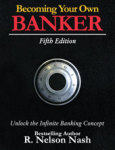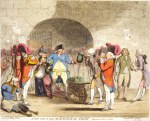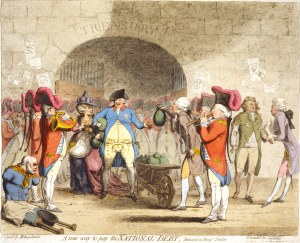by R. Nelson Nash
Author of Becoming Your Own Banker
Article originally published in the October issue of BankNotes
It should be evident to most people that the last 100 years have been very violent in the financial world. Why? What happened to cause all this turbulence?
During this period we have witnessed the bloodiest century of all time. Two World Wars. Endless smaller wars all over the earth. An influenza epidemic after WWI. Nations formed and then self-destructed. New diseases coming into existence. Endless turmoil in the Mid-East. Empires coming apart. Financial euphoria followed by inevitable busts. Unbelievably powerful weapons and weapon systems. Propaganda perpetrated on an unsuspecting public such as man-made global warming. The list could take several pages to itemize them.
So, what’s going on? All of these actions are preceded by thoughts of the people involved at any time and place. Or, maybe it could be best described as lack of thought! It appears to me that people have forgotten how to live. It could be that they never learned how to live in the first place. Maybe it could be because of the way people feel. We seem to have a generation of “touchy-feely” folks that are in places of leadership and they influence the actions of every-day people.
Wars make absolutely no sense, but it is evident that this behavior is a common denominator throughout this time frame. Nothing good came from them. Yet, wars are glorified in the minds of many people. Things like Tom Brokaw’s book, The Greatest Generation. In reality it was a disaster — because of what it did to the minds of the people. They heard lies and came to believe them. Our country had already adopted Socialist ideas a number of years earlier, but this head-long plunge gained tremendous momentum during this period. I was there to witness it as a teenager and have seen it unfold to become the monster that we have today.
The historian, Dr. Clarence B. Carson wrote a masterful book entitled, The World In The Grip Of An Idea back in the 1970’s. He did a great job of explaining how we got into this abominable situation. The book needs to be re-published and Dr. Paul Cleveland and Dr. L. Dwayne Barney are in the process of re-writing it at this time. The world needs this book very much and so I encourage you to get a copy when it becomes available.
From my own perspective, money is the real common denominator in human action. The great Austrian Economist, Ludwig von Mises points out that the business cycle is caused by central banks. They inflate the money supply dramatically and people can’t tell the difference between “real money” and the “counterfeit money” (fiat money has no real basis). They feel that it is real wealth and so they do things that are totally irrational. This creates booms in the economy. In due course of time, reality rears its ugly head, and the bust follows.
This pattern has a long history, but it seems that every generation during the boom years feels that “Yes, those things happened in the past – but, this time it’s different!” This is nothing but hubris in its purest form. It is the “Arrival Syndrome” that I describe in my book, BECOMING YOUR OWN BANKER. It is the worst thing that can happen to the human mind!
Government debt all over the world is huge. But, consumer debt in these nations is approximately equal in volume. Bankers have created a mind-set in people that “you don’t have to save money– just spend, spend, spend! We are going to take care of your financial needs.” A local Credit Union advertises “Get a Legacy Lifestyle Loan from us.” Translated: “If you don’t like your present lifestyle, then get a loan from us so you can live the way you want to today! Don’t worry about having to repay the loan.”
We are bombarded with such stuff every day. If you listen to financial advertising very long then it becomes “hourly!”
Your local, commercial banks are the primary source of inflation. They lend money that doesn’t exist. If anyone else did that they would be put in jail! But, this chicanery has been going on so long that most everyone considers it normal.
In the video, Banking With Life, Dr. Paul Cleveland points out that people confuse money with wealth. Wealth is your productivity, and things that you own. Money is just the medium of exchange that we use to acquire wealth. Creating a pool of money from which to buy wealth is a necessary function in an economy. This pool of money is known as banking! We could not live the way we do today without the concept of banking! It is sovereign! Some party in your life is going to be the banker whether you recognize it or not!
That party should be you! John Donne (1572-1631) gave us the thought, “No man is an island.” Therefore, this Infinite Banking Concept must involve other people in the form of a contractual relationship. The perfect financial instrument to accomplish this has been in existence for over 200 years. It is known as Dividend-paying Whole Life Insurance (Preferably with a Mutual Company – one that is owned by the policy owners). Your medium of exchange must be warehoused somewhere! There are no exceptions!
This is a place that cannot inflate the money supply. This Infinite Banking Concept has been taught through my book, Becoming Your Own Banker and the follow-up book, Building Your Warehouse of Wealth. Further explanation is provided by How Privatized Banking Really Works by Carlos Lara and Robert P. Murphy, PhD.
Through these books and seminars that are taught all over the USA and Canada, there are now thousands of people who will never have to make loans from an institution that inflates the money supply and creates “booms and busts.” You, too, can become your own banker!
Please see the October issue of BankNotes for the original article and others like it.


















